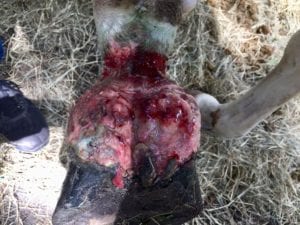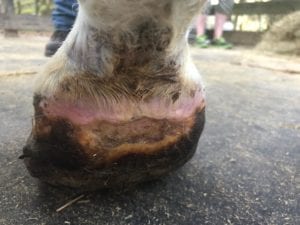Our Spotlight Series is back! Over the years our clients have asked some great medical questions. We are focusing on your questions this year and will be answering them over the next several weeks in #AskTheVet.
Next up in our 2021 Spotlight Series #AskTheVet is Dr. Jill Copenhagen from our Peak Performance Equine Services team!
Question: My horse had terrible summer sores last summer. Do you have any tips to prevent them? What is the best way to treat summer sores?
Answer:
To best evaluate how to prevent summer sores or habronemiasis, it is important to understand how they occur.
Summer sores are the result of the life cycle internal parasites, either Habronema or Draschia species, gone awry. The parasites conduct their normal lifecycle in the GI tract of the horse. As part of their normal life cycle, the adults lay the eggs that are then passed in the manure of the horse. They hatch and are ingested by fly larvae in the manure, maturing with the maggots into adult house, stable, or face flies. Flies are attracted to the moist mucous membranes at the corner of lips, around the eyes, or any open wounds. Once the worm larvae sense an ideal environment, they leave their hosts and take up residence on the horse. To complete their life cycle, they must be ingested by the horse. If they are deposited in areas away from the mouth, they are often at a dead end. They will try to find a way in by burrowing through the tissues leading to inflammation and tissue damage. The horse is often irritated by the lesion and will bite and scratch at it, only making things worse. You are left with a raw, inflamed wound with oozing drainage and white or yellow granules present at the surface.
These sores rarely heal on their own. It is important to have your vet out to confirm that you are truly dealing with a summer sore as they can mimic other significant lesions to the horse including cancers or foreign bodies. To treat summer sores, we want to stop the production of new larvae, decrease the inflammation in the lesion, remove any parasites from the lesions, and eliminate exposure to flies which encourages re-infection. The patient and stablemates should be dewormed with ivermectin or moxidectin to eliminate the adult worms that may be replicating in the GI tract. To treat the inflammation, corticosteroids either systemic or topically, are used. Depending on the amount of tissue present, the wound itself may need to be debrided. We can also apply ivermectin directly to the wound to kill any larvae present. Lastly, we want to cover the wound to decrease exposure to flies and further transmission of the larvae. 

Prevention of these lesions stems from establishing proper fly control and an appropriate deworming program for your barn. Consult your veterinarian to discuss a deworming program. Make sure that manure is picked up and kept away from the stables. Other methods to decrease flies include fly predators, fly traps, and feed through fly controls. Protect horses by using fly apparel such as masks, boots, and sheets. Keep any open wounds covered. If that’s not possible, apply fly repelling ointments.
Practical Horseman has a really good article with more information and details. And always, your veterinarian is the best source for information regarding your specific horse.
https://practicalhorsemanmag.com/health-archive/summer-sores-28596
Recent Posts
About Us
At B.W. Furlong & Associates, we are progressive leaders delivering the ultimate in veterinary care to our equine patients and clients in both the hospital and ambulatory setting. We have several associated practices offering exemplary care and services in New Jersey, Florida, and Virginia
